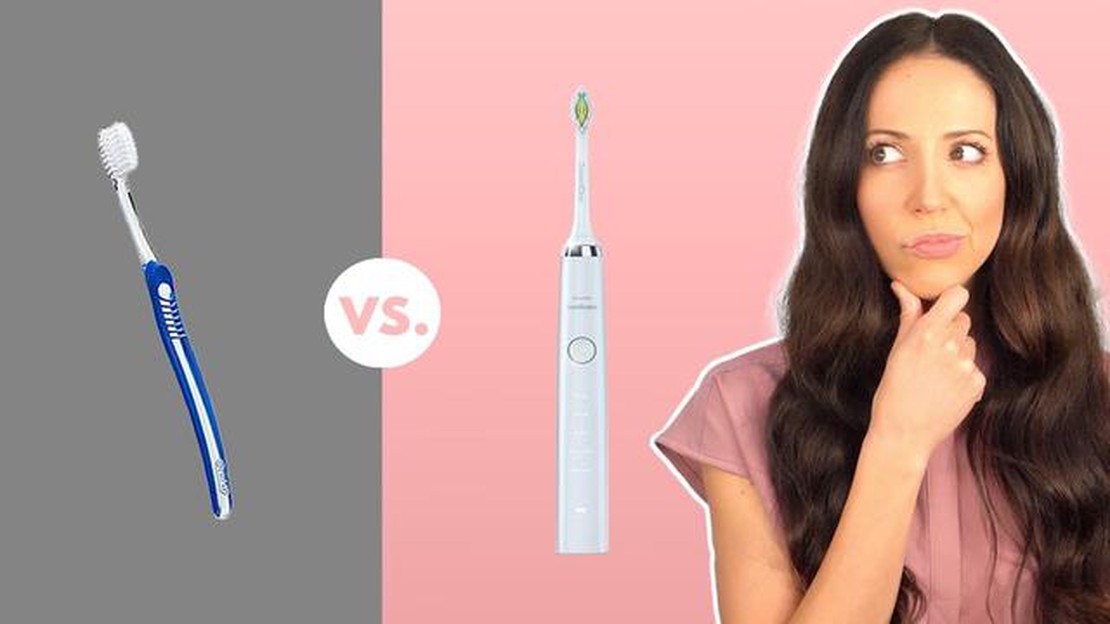Easy Steps to Mute Someone on Snapchat: Complete Guide
How To Mute Someone On Snapchat Are you tired of seeing endless snaps and messages from someone on Snapchat? Or maybe you just need a break from …
Read Article
Oral health plays a huge role in a person’s overall health. Proper and regular brushing and oral care are an integral part of this process. One of the key issues when choosing a tooth brushing product is choosing between an electric and manual toothbrush. Which one to choose is a question that people often have.
The electric toothbrush has become popular in recent years due to its effectiveness and ease of use. It features a rotating head and is made of high quality materials. An electric toothbrush can effectively remove plaque and bacteria from the surface of the teeth and gums, which helps prevent tooth decay and gum disease. However, it is worth noting that an electric toothbrush requires recharging and is more expensive than a manual toothbrush.
On the other hand, a manual toothbrush is more affordable and familiar to most people. It does not require charging and can be used in any environment. Manual toothbrushes also come in different shapes and stiffness of bristles, allowing you to choose the right model for each individual case. However, a manual toothbrush can be less effective at removing plaque and more difficult to use, especially for children and the elderly.
When choosing a toothbrush, everyone should consider their individual needs and preferences. It is important to realize that the effectiveness of brushing depends on how well we brush our teeth and how often we do it. However, choosing between an electric and manual toothbrush can also play a role in this process.
Manual toothbrush.
** Electric toothbrush
Read Also: How To Fix The Error 87DE2712 On Xbox Series S - Step-by-Step Guide
6. Usually more expensive compared to manual brushes. 7. May cause discomfort or inconvenience during use. 8. Requires charging or battery replacement.
The overall conclusion is that the choice between an electric and manual toothbrush depends on each user’s individual preferences and needs. If you care about a more affordable option and prefer more control over your brushing, a manual brush may be a better choice. However, if you are looking for a more efficient and convenient option, an electric brush may be a better fit.
In the end, the most important thing is to brush your teeth properly and regularly, regardless of the type of toothbrush you choose.
Read Also: How to Troubleshoot Clash of Clans Not Loading on Android Phone
An electric toothbrush is a modern oral hygiene tool that has a number of distinct advantages over a manual toothbrush:
These benefits make an electric toothbrush an attractive choice for anyone looking for a more efficient and convenient brushing experience for their teeth and gums.
Let’s take a look at the main benefits of using a manual toothbrush:
Overall, manual toothbrushes provide a fairly effective and affordable alternative to electric models. However, choosing between the two ultimately depends on each person’s individual preferences and needs.
Choosing between an electric and manual toothbrush depends on your preferences and needs. Both brushes can effectively clean your teeth, but an electric brush is often considered more effective because it can clean your teeth at a faster rate and remove plaque better. A manual brush may be preferred for those who prefer a more controlled and gentle brushing experience, or for those who have hand health issues or limitations in using an electric brush.
Choosing between an electric and manual toothbrush depends on your preferences and needs. An electric toothbrush is usually more effective in removing plaque and tartar because it has built-in bristle movement. However, some people are more comfortable using a manual brush and need more control over the movements. There is no perfect brush for everyone, so it’s best to decide what works best for you.
How To Mute Someone On Snapchat Are you tired of seeing endless snaps and messages from someone on Snapchat? Or maybe you just need a break from …
Read ArticleHow to Fix Star Wars Jedi Survivor Crashing Issue on PC If you’re a Star Wars fan and you’ve been experiencing crashes while playing Star Wars Jedi …
Read ArticleFacebook secretly created a facial recognition app that allows employees to identify people by pointing their phone at them The largest social network …
Read ArticleHow To Fix COD Black Ops Cold War Voice Chat Issues | No Sound Call of Duty: Black Ops Cold War is a popular first-person shooter game that allows …
Read ArticleHow To Invite And Add Friends On Fall Guys | PC & PS4 Fall Guys: Ultimate Knockout has quickly become one of the most popular multiplayer games, and …
Read ArticleHow to Set up Car Mode in Samsung Galaxy S5 The Samsung Galaxy S5 comes with a feature called Car Mode, which is designed to provide a safer and more …
Read Article